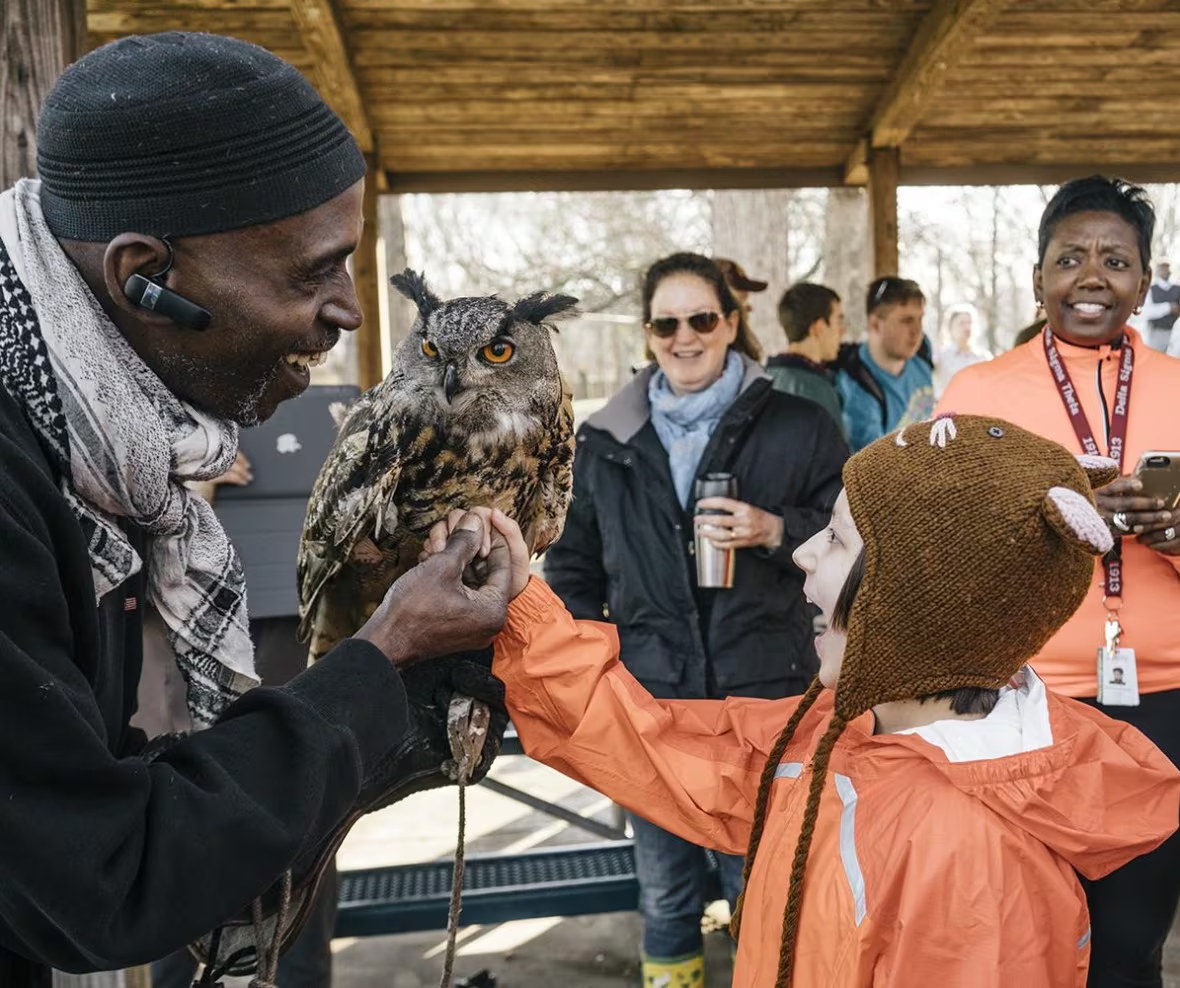From drug dealing to master falconer, one man's life-changing journey
A chance encounter with a red-tailed hawk led Rodney Stotts down a path of environmentalism and falconry

According to Rodney Stotts, growing up in southeast Washington, D.C., usually led to one of three different paths: professional sports, drug-using or drug dealing.
Stotts initially took the third path — until an encounter with a red-tailed hawk in the middle of a drug deal sparked a hidden passion.
"I just saw this huge hawk [fly across] … and everyone was saying, 'Come on, come on, you know, put your money up,'" he told The Current's guest host Duncan McCue. "I'm like, 'Hold on, man. I'm watching this bird.'"
There's a love [between] me and all of my animals that is hard to describe to people.-Rodney Stotts
"People were looking at me like I was crazy because you're standing there, you have a gun, they have guns, money, drugs … [and] you're standing here looking at a bird."
He compared the excitement he felt to "blowing out your birthday candles."
"What really hit me was the fact that it was this predator — it was this apex predator, and it just looked so beautiful, so harmless," he said.

That's an excitement Stotts now feels on a regular basis — as a master falconer. Through his organization Rodney's Raptors, Stotts teaches children and adults about the predatory birds like hawks and owls.
In his new book, Bird Brother, he details his transformation from drug dealer to one of the only Black master falconers in North America — and the connection he has with the animals he now cares for.
A beautiful blessing
Although the encounter with the hawk sparked his interest in birds, Stotts had a connection with nature long before that.
Some of his earliest memories as a child were going to Anacostia Park in Washington, D.C., and exploring the trails, creeks and tributaries that flowed through it to join the Anacostia River.
"We would just go and catch little crayfish and minnows and water moccasins," he said. "So I've always been around animals."
WATCH | Rodney Stotts on being a Black master falconer
Later in life, those same tributaries played a role in his journey to environmentalism. While he was still involved with drugs, Stotts got a job with Earth Conservation Corps, and helped to clean up the heavily polluted tributary called Lower Beaverdam Creek.
"We started cleaning that mile stretch of the tributary and started seeing beavers and great blue herrings and fish and frogs and everything come back," he said.
It was this feeling of just like a mother giving birth, in a sense. You were just seeing all of this new life knowing that you were responsible for bringing it back.- Rodney Stotts
It was one of the "most beautiful blessings I've ever had in my life," he said.
"It was this feeling of just like a mother giving birth, in a sense," he said. "You were just seeing all of this new life knowing that you were responsible for bringing it back."
A Black falconer
In 2002, Stotts was arrested for dealing drugs, and given a two-year sentence, with all but 120 days suspended.
"That was the best thing that could have happened to me because it gave me time to really sit down and evaluate what was more important in my life," he said.
Following his release in 2003, he decided he wanted to leave drug dealing behind, and get more involved with environmentalism.
He pursued conservation work in the years that followed, but didn't decide to become a falconer until 2009, when Earth Conservation Corp founder Bob Nixon started a new non-profit called Wings Over America. The group gave youth who had committed serious offences a chance to care for raptors.

But becoming a falconer wasn't an easy task. Stotts would have to score 80 per cent or higher on a state test in order to become an apprentice, the first level of falconry.
Then, he had to be sponsored by and work with a master falconer, in order to gain experience.
Finding a sponsor was proving difficult for Stotts, and he faced discrimination and rejection for the colour of his skin.
"One guy said, 'You sound like you're a Black man … Black people don't fly birds. Y'all eat them,'" he said. "I just burst out laughing. It was funny to me, and it just fuelled me to keep going."
Stotts eventually found a sponsor in Suzanne Shoemaker, the director of a bird sanctuary in Maryland and a master falconer herself. She was familiar with Stotts' work, and confident in his skills.
When Stotts passes the state test, she was the first person he called.
"I was crying out, 'Ms. Suzanne, I passed! I passed!' [And] she said, 'I already knew you was going to pass,'" he said.
"The way she said it was just all the confidence in the world, and it just made the biggest difference."
Passing the torch
Today, Stotts cares for five Harris's hawks: Agness, Nanny, Gloria, Chuck and Squeal.

He hopes to pass on the knowledge he has to the next generation of falconers.
"To have these young people understand that because you are Black or because you're from the [housing] project or because you're not wealthy, you can still have and do and prosper just as anyone else can, that's the one thing I love to see in their faces," he said.
It's clear he's leaving a mark on them. He's already promised one young would-be falconer he'll sponsor her when she turns 15 — and she won't let him forget it.
"This little girl calls me every year on her birthday to remind me that she's almost 15 … and I love that," he said.
Written by Mouhamad Rachini. Produced by Lindsay Rempel.
